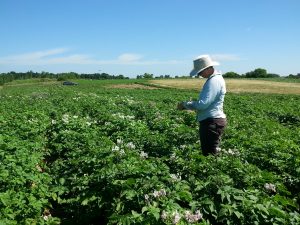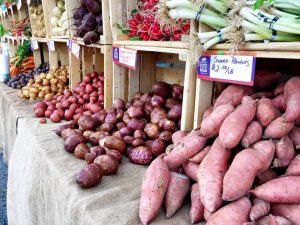We’ve all been there. It’s the deep winter, the days are short and cold. The farm is buttoned up for the season. For the first time in nearly a year, we have the time and space to dream. It is Planning Season, the weeks in the winter when we pour over the seed catalog and drool over flashy new varieties, voraciously seek out our old standbys, and mourn the loss of discontinued favorites.
 If you’re like me, you likely have poor impulse control and are drawn in by the (sometimes) poetic variety descriptions and artistic plant photography. I am drawn to the unusual, a purple carrot or a stripped tomato. “Oh, I’ve never heard of a sunberry, I must grow it!” Yet, I am often left with an uneasy feeling when it comes time to click “check-out”. Will these varieties grow well in my western Illinois timber soils? Do these carrots germinate uniformly enough to use my flame weeder? Will my customers like the flavor of this tomato? Selecting varieties can be a gamble and farming has enough variables that are out of my control. Variety selection, I can control.
If you’re like me, you likely have poor impulse control and are drawn in by the (sometimes) poetic variety descriptions and artistic plant photography. I am drawn to the unusual, a purple carrot or a stripped tomato. “Oh, I’ve never heard of a sunberry, I must grow it!” Yet, I am often left with an uneasy feeling when it comes time to click “check-out”. Will these varieties grow well in my western Illinois timber soils? Do these carrots germinate uniformly enough to use my flame weeder? Will my customers like the flavor of this tomato? Selecting varieties can be a gamble and farming has enough variables that are out of my control. Variety selection, I can control.
An important and underused tool in the farmer’s tool box is the on-farm variety trial. Over my next several blog entries, I will explore the process of setting-up, conducting, and evaluating a variety trial on a working farm. Today, I’ll start with the most pressing question: “I am a working farmer. I am pressed for time and resources. Why should I go to the effort of doing a variety trial when there are researchers, seed breeders, and agronomists who do this professionally?” Variety trials are often thought of as something to be left to the researchers, seed breeders, and agronomists among us. But, there is no substitute to learning what varieties work best on your unique farm.
 I recently attended the On-Farm Variety Trialing Workshop held last week by the Organic Seed Alliance at PrairiErth Farm. There, I met University of Wisconsin researcher Dr. Ruth Genger. She led a tour of PrairiErth Farm’s potato variety trial and described what she values so highly in farmer-led, on-farm research. “Farmers ask questions that researchers often overlook or do not have the resources to ask,” she said. “It is impossible for a university trial to assess all crop management systems, soil types, and climates.” Dr. Genger uses information gained in farmer-led trials to supplement, inform, and improve the formal trials she designs at the university’s research plots.
I recently attended the On-Farm Variety Trialing Workshop held last week by the Organic Seed Alliance at PrairiErth Farm. There, I met University of Wisconsin researcher Dr. Ruth Genger. She led a tour of PrairiErth Farm’s potato variety trial and described what she values so highly in farmer-led, on-farm research. “Farmers ask questions that researchers often overlook or do not have the resources to ask,” she said. “It is impossible for a university trial to assess all crop management systems, soil types, and climates.” Dr. Genger uses information gained in farmer-led trials to supplement, inform, and improve the formal trials she designs at the university’s research plots.
Organic Seed Alliance’s Research and Education Associate Kit Healy also added that information about variety performance is not always true to Midwest growing conditions because most commercial seed breeding companies conduct their trials on the Pacific and Atlantic coasts where the weather and soils are very different than in Illinois. “Farmers will buy a variety based on the catalog description only to find that sometimes the plant does not perform as expected because our springs are colder or our summers hotter.”
On-Farm variety trials are particularly useful in certain circumstances like:
- Replacing a discontinued variety;
- Testing for particular pest and disease resistance;
- Vetting a variety for performance in your management system.
 At the variety trial workshop, farmer Hans Bishop described why he chose to do an on-farm variety trial. “I was trying to find a potato variety that would address several problems I was experiencing with my usual varieties,” he said. “We lose so much yield to potato leafhopper damage and I needed to find a variety that was more resistant [to that pest].” Hans was also looking to see how these varieties compare in shading out weeds and in customer response to flavor and appearance. “No one but me can answer the question of what my customer responds to,” concluded Hans. Armed with a seed catalog, his copy of The Grower’s Guide to Conducting On-Farm Variety Trials (available for free download), and a list of questions, Hans set about designing his potato variety trial.
At the variety trial workshop, farmer Hans Bishop described why he chose to do an on-farm variety trial. “I was trying to find a potato variety that would address several problems I was experiencing with my usual varieties,” he said. “We lose so much yield to potato leafhopper damage and I needed to find a variety that was more resistant [to that pest].” Hans was also looking to see how these varieties compare in shading out weeds and in customer response to flavor and appearance. “No one but me can answer the question of what my customer responds to,” concluded Hans. Armed with a seed catalog, his copy of The Grower’s Guide to Conducting On-Farm Variety Trials (available for free download), and a list of questions, Hans set about designing his potato variety trial.
In next month’s blog, I will explore what you need to know to plan a variety trial on your farm. By the end of this series, you will have everything you need to set-up your own variety trial for the 2019 growing season. Until then, enjoy the sweet corn and melons of high summer!


